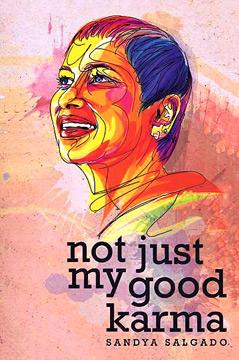
A review of Not Just My Good Karma by
Sandya Salgado
An easy to read autobiography, crafted in a convivial tone, Sandya Salgado’s ‘Not Just My Good Karma’ is an interesting trajectory of emotions and recollections. The book weaves a mosaic of events and experiences by the author, carrying in its textual threading, subtle (and perhaps subconscious) undertones of catharsis, ebullient unhidden celebrations of her accomplishments, and steadfast propounding of her beliefs and ideological standpoints.
‘Not Just My Good Karma’ is a personal reflection chronicling what it means for the author to be who she is and what moulded her being. For all that she has accomplished Salgado doesn’t appear to make her book the story of a self made woman. Rather it is an honest admission that she cannot claim she grew into a continent being an island unto herself. Salgado gives credit where it is due, claiming for herself the mettle of a woman determined to succeed while being conscious that she drew inspiration from persons, events and realisations, realising that strengths within share an inexplicable nexus to the narrative of life that unfolds around us.
The book begins with charting the charms of the author’s hometown, Panadura, which is something of an ‘outpost’ of the ‘proud South’, caught between the borders of the traditional South and the country’s hub of modernity, Colombo. Salgado offers snippets of semi-urban Panadura life that are amusing while also telling of ‘factors’ that are nowadays not spoken of openly, and conveniently ‘pretended out of existence’ in Sri Lanka’s urban societal fabric. This being the caste aspect of Sri Lankan society, inspecting the caste factor in her hometown from observations of her own, Salgado also mentions the clash of perceptions of superiority, between the ‘Govigama’ and ‘Karawe’ castes, which is an unsettled debate particular to the low country caste system of old.
Salgado’s picture of familial warmth, joys and challenges begins with her childhood ensconced in her parental (and incidentally grandparental) home of 381, Nalluruwa, Panadura which was the setting for many a vibrant story! The large-hearted hospitable open house culture of olden times is brought back to life vibrantly bringing to life an entire way of life in the setting of her home that was the abode for over three generations of her family. Though not of equal scale in the crowd milling vibrancy as 381 Nalluruwa, Panadura, reading about it, I couldn’t help but recall what was my own maternal grandparental home of 102 Fife Road, Colombo 5, which now houses the lifestyle store ‘Selyn’.
What Salgado brings to life with her recollections of 381, Nalluruwa, Panadura, is a way of life that is found no more in Sri Lanka. It is thus important that works of this kind preserve a record of what life was like back then, so that younger generations may know the trajectory of Sri Lankan society and their ‘ways’ of being family and community. Apart from family and what charted her life to develop the outlooks and mettle she possesses today, the book also speaks of the causes and crusades the author embarked on as a woman determined to stand up for what she believes in. Those who read the book would realise while growing up as a girl in a world with stereotyped traditional outlooks, ‘fairness’ is a factor she had to wrestle in many ways.
The bulk of the narrative is quite understandably based on her life as a career woman in the highly demanding advertising sector of Sri Lanka. The presence of an advertiser’s psyche is also noticeable in the book, since many of the sections/parts have been entitled with phrases that were connected to popular advertising campaigns that should be familiar to many a Sri Lankan; examples being, ‘Yahagunayen Idiriyata’, ‘Punchi Pavula Raththarang’, to name two of the five.
The language Salgado has crafted for her narrative is one that brings to life much Sri Lankan tone and diction lacing Sinhala phraseology to give not merely oomph but also cultural rootedness. Though some phrases from the Sinhala language written in English script are explained for the benefit of a reader who is not familiar with Sinhala idioms and phrases, the lack of paraphrased explanation of all such elements from Sinhala, shows that Salgado’s principal audience seems to be intended as a Sinhala – English bilingual readership.
The centre stage of Salgado’s career in advertising begins with the chapter titled, ‘The Phone Call’. The phone call, which was from the chairman of Phoenix Ogilvy, Irwin Weerackkody, was a ‘calling’. It marked the start of what was to become Salgado’s most significant contribution to the advertising industry in Sri Lanka, the pioneering of an innovative, advertising outfit that eventually became the agency known as Ogilvy Action.
‘Not Just My Good Karma’ may not be everyone’s cup of tea, no matter how avid the reader. The reason I say this is, in terms of genre, although it is technically autobiography, the variety of topics and subtopics that Salgado brings out become at times a skimpy discursive with little story substance and strung together as ‘mentions’. I would say Salgado seems to have failed to delve into and dwell sufficiently on kernels of familial stories which could have surely provided more engrossing narratives. However, her narratives about her time in the advertising industry being more detailed and elaborate would surely make the book seem more addressed to those who wish to gain kernels of industry knowledge from the author’s experience.
Much unfolds through the vibrancy of the authorial voice as a personal account of what the author can testify as her journey through the different stages of life, challenging the status quo and carving her path through the varying tides of karma, both good and bad. Here is a story of the good, the bad, the cheeky, and also the glamorous.
